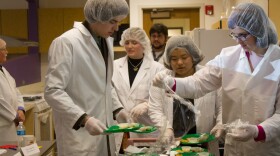In the U.S., one in six people struggle with hunger. Food pantries across the country pass out food to help these people put meals on the table. But what if they could help teach the pantry visitors how to grow their own food, too?
Grow Well Missouri, a program that travels to food pantries around central Missouri, is trying to do just that, passing out seeds and starter plants to low-income locals.
On a recent wet spring morning, the group was set up in Columbia, Mo. Four volunteers for Grow Well Missouri worked under a blue popup tent outside of Central Pantry, repotting about 50 starter tomato plants into larger containers. They had a steady stream of visitors stopping by, curious about what’s going on.

Volunteer Marie Paisley packaged a tomato plant, a trowel and literature on how to successfully grow the plant all into a tote bag. Then she passed it to food pantry customers with some helpful tips on how to care for the plant.
“When you get it home, you need to water it through thoroughly, ‘til the water runs out the bottom of the container,” she said.
Bill McKelvey created Grow Well Missouri, now in its second year, in part to provide better access to healthful food.
“It’s really probably the highest quality food you could get, right?” he said. “You’ve grown it yourself, you pick it and you eat it.”
When people visit food pantries, there isn’t always the healthiest selection. And fresh produce is really hard to come by, especially for people who rely on food banks.
“You know a lot of what obviously is donated because it keeps longer is stuff that’s canned,” said Livia Marques, a food and health program officer with the WK Kellogg Foundation. “So having that access to produce through different means I think is really critical. Clearly giving people the opportunity to grow it themselves is optimal.”
McKelvey says the program also tries to deliver more than just nutritious food.
“I think gardening provides people with a sense of satisfaction and a sense of self sufficiency, and that's regardless of your income,” he said.
Out of the 158 program participants surveyed last year, nearly 90 percent actually planted gardens. And more than 90 percent of the gardeners say they shared their produce with friends and family. McKelvey said connecting people to their food also helps connect them to each other
Coresa Colony snagged a tomato plant in Columbia and said she shares the experience with her son. They enjoy growing tomatoes and eating them and a starter plant from Grow Well Missouri will allow them to integrate more fruits into their diets
McKelvey said more than half of the people who pick up plants or seeds have some form of gardening experience. Many of those gardeners start with seeds, which clients can also pick up inside the pantry.
Just past the bread shelf and halfway to the cooler there are hundreds of seed packets set on the table along with instructions and tips on how to grow them. Pantry shoppers pick up seeds from volunteers Debra Blakely and Kate Markie for everything from carrots and spinach to cantaloupe and watermelon.

“When I did this a few weeks ago, we offered flower seeds”, Blakely said. “I saw their faces light up because they had already been by to pick up their vegetable seeds, but then they say, ‘Oh today you have flower seeds!’ So yeah, they stop by again.”
McKelvey said that ultimately the goal is to have people returning and trying new fruits and vegetables every year. That can help food pantries develop a more sustainable relationship with their clients, and can help clients continue to access fresh food and the health benefits that come with it.
“A lot of the work we’re doing now is really going to help us build a model for how other groups can do this project,” McKelvey said.
He said beginning at the end of the year, Grow Well Missouri will host workshops and training sessions for other Midwest groups interested in initiating their own version of the project.






